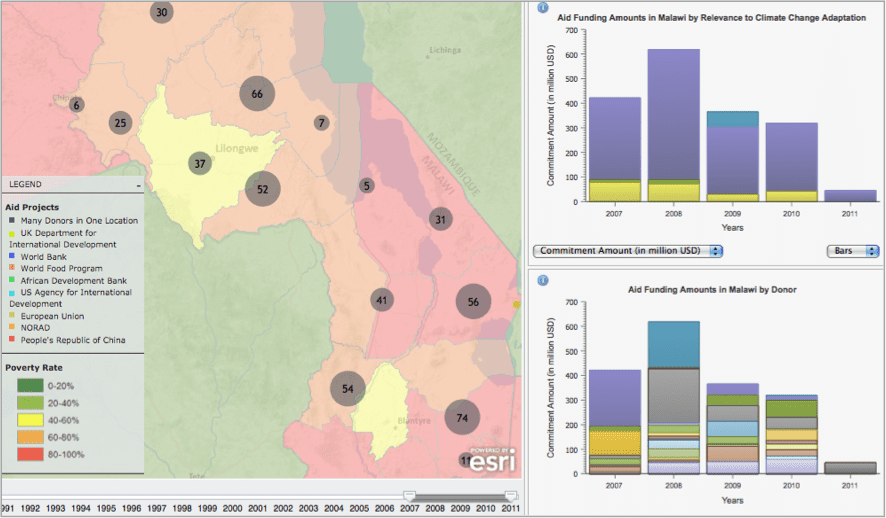Categories
Strauss Center Releases New Data on Climate Aid in Africa
Aug 9, 2012 | Adaptation AidCCAPS
The Strauss Center’s Climate Change and African Political Stability (CCAPS) program today released the first-ever dataset tracking all climate aid activities in a single country. In the pilot study, CCAPS researchers applied their new “climate coding” methodology to all official development aid projects in Malawi’s Aid Management Platform, assessing each project activity for its relevance to climate change adaptation.
The resulting database reveals how much of Malawi’s current aid portfolio represents funding allocated specifically for climate-oriented development. It also reveals how much of Malawi’s aid is not explicitly climate-related, comprised of development projects that could have varied degrees of positive or negative impacts on climate change adaptation. This new Malawi Climate-coded and Geocoded Aid Dataset can be searched and downloaded online or mapped on the CCAPS aid dashboard.
“Our goal is to generate more timely, detailed, and useful information on climate finance to Africa to better understand where resources are being effectively mobilized to address the continent’s vulnerability to climate change,” said Dr. Catherine Weaver, Associate Professor at the LBJ School of Public Affairs and a lead researcher on the CCAPS program.
CCAPS researchers “climate coded” over 700 projects in Malawi and found that climate aid, narrowly defined, makes up just 1-2% of aid to Malawi. Norway, the World Bank, USAID, and the European Union are among the donors most involved in adaptation aid in Malawi. Japan and Ireland have several adaptation-related projects, yet their financial contributions are much smaller.
The new dataset opens the door for detailed comparative analysis of adaptation programs and their effectiveness in targeting specific climate risks within a country. Through a collaboration between CCAPS, AidData, and the Government of Malawi, the data were also geocoded, allowing analysts to assess the aid allocation visually as well.
New climate aid dataset informs aid assessment and planning
Detailed aid project data included in the CCAPS aid dashboard can be used to coordinate adaptation and other development efforts.
Data are currently available on the new CCAPS aid dashboard“”a collaborative effort that includes geocoded aid data from CCAPS and several partner institutions. Development Gateway and CCAPS built the aid dashboard to combine trends analysis with the most comprehensive collection of geocoded data on aid projects in Africa.
The aid dashboard includes three geocoded aid datasets: CCAPS’ new climate-coded aid data for Malawi geocoded in partnership with AidData; African Development Bank projects continent-wide geocoded by AidData; and World Bank projects continent-wide geocoded through the World Bank-AidData Mapping for Results initiative.
“The CCAPS aid dashboard allows analysts to explore aid spending as big picture trends or local project information,” said CCAPS program manager Ashley Moran. “Our aim is to provide these new data in a way that is as useful as possible to policymakers and researchers needing to ask very focused questions about aid investments and impacts.”
New CCAPS aid dashboard offers many ways to analyze development trends

The CCAPS aid dashboard allows users to explore trends in aid allocation by donor, sector, and demographics within a country.
Weaver’s research team plans to expand the CCAPS climate-coding effort continent-wide for several large donors over the next year. The data will be updated on the CCAPS aid dashboard as they become available.
Funded by the U.S. Department of Defense’s Minerva Initiative, the Strauss Center’s program on Climate Change and African Political Stability aims to assess where and how climate change poses threats to stability in Africa, develop strategies to build government capacity to respond, and evaluate the effectiveness of foreign aid for climate change adaptation in Africa. For more information, visit www.strausscenter.org/ccaps.


